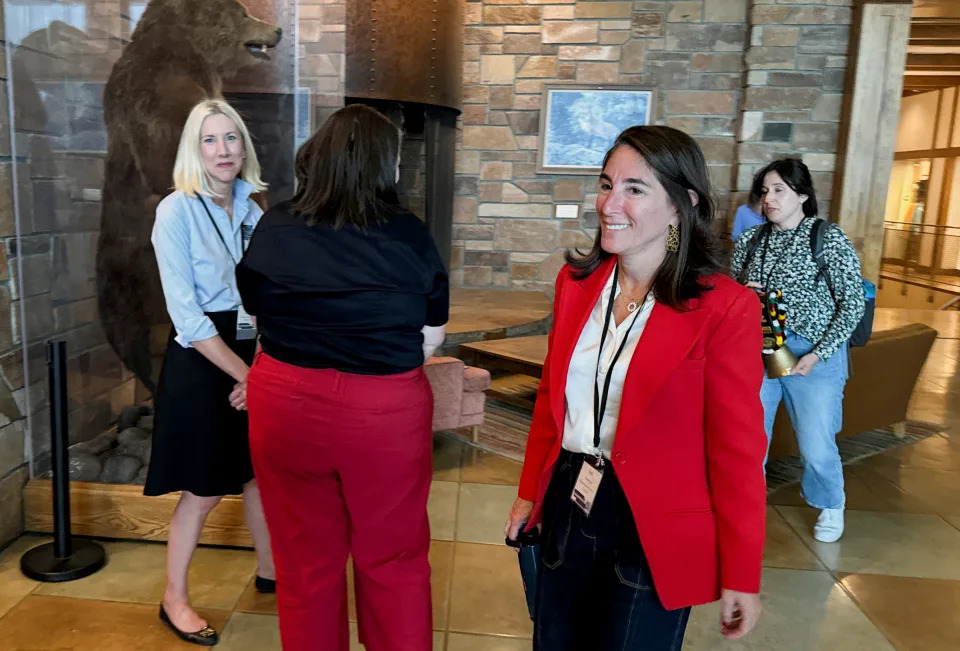The lone dissenter to the Federal Reserve’s rate cut this week said she voted against the move because “there is more work to do on inflation,” noting that she preferred to pause given the strength of the US economy.
"Based on my estimate that monetary policy is not far from a neutral stance, I prefer to hold policy steady until we see further evidence that inflation is resuming its path to our 2% objective," said Beth Hammack, the president of the Cleveland Fed, in a new statement Friday.
Read more: What the Fed rate cut means for bank accounts, CDs, loans, and credit cards
Hammack said her decision was a "close call" but that she believes "monetary policy will need to remain modestly restrictive for some time."

Another central bank policymaker, San Francisco Fed president Mary Daly, told Yahoo Finance Friday that she agreed this week's vote was "a close call."
But Daly ultimately concluded it was appropriate to cut as part of a process of "right-sizing the policy rate level to the economy," she said on Yahoo Finance's Opening Bid podcast.
"We now are back to the time we can make our decisions more slowly. Data-dependent, using the data to affect the incoming forecast and, you know, determine how many rate cuts we'll ultimately do next year. We'll have to be agile and data-dependent."
Hammack’s dissent was the second since the Fed began its rate-cutting cycle in September. The first was Fed governor Michelle Bowman, who voted in support of this week’s 25 basis point cut.
Fed officials this week did also scale back the number of cuts they expect to see in 2025 to two from four due largely to concerns about the persistence of inflation.
New inflation data out Friday showed price increases fell month over month in November but still remained sticky as the central bank fights to bring inflation back down to its 2% target.
In November, the core Personal Consumption Expenditures (PCE) index, which strips out food and energy costs and is closely tracked by the Fed, rose 0.1% from the prior month, a deceleration from October's 0.3% monthly gain in prices. The monthly increase came in slightly lower compared to economist expectations of a 0.2% increase.
Over the prior year, core prices rose 2.8%, matching the increase seen in October and also lower than Wall Street's expectations of a 2.9% rise. On a yearly basis, overall PCE increased 2.4%, a pickup from the 2.3% seen in October. Economists polled by Bloomberg had anticipated a yearly increase of 2.5%.
Hammack said monetary policy has played an important role in bringing PCE inflation down considerably from its peak of 7.2% in the summer of 2022.
But "despite these positive developments, inflation remains elevated, and recent progress in returning inflation to 2% has been uneven."
Because the job market remains healthy, she wants the Fed to focus on getting inflation back down to 2%.
"It is important to maintain the focus on returning inflation to 2% in a timely fashion," she said.
Daly called the PCE inflation report for November "good news," but added that we shouldn't get too excited about just one data point. She said she would remain information-dependent and said policy needs to stay restrictive to bring down inflation.
“I see the recalibration period now as completed,” said Daly. “Now we are back to the time when we can make our decisions more slowly … using the data to affect the incoming forecast and determine how many rate cuts we'll ultimately do next year.”
She added that the Fed is not “done cutting rates,” just adjusting at a slower pace.
Daly also didn't rule out a rate hike in 2025.
"I never rule out anything honestly because that's a recipe for being behind or [making] mistakes," Daly said.
"But I can tell you where I think the most likely place will be. We could have fewer cuts than two. We could have more cuts than two depending on the data. Of course, if inflation for whatever reason started to accelerate again, then absolutely I'd be supportive of adjusting the rate upwards. But I don't see that right now on the horizon."




